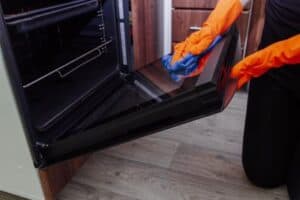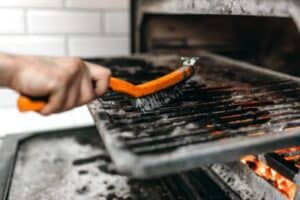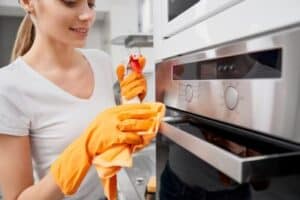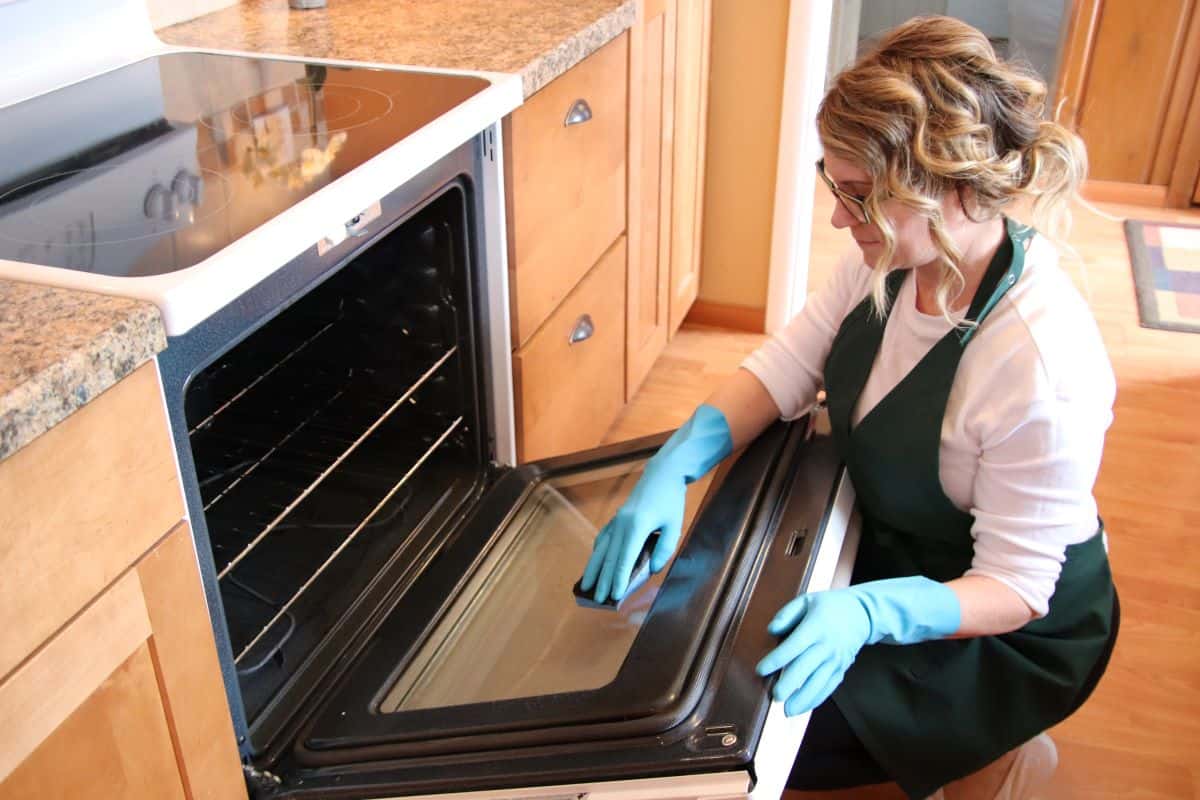How to Make DIY Oven Cleaner
If you have a dirty oven, it can be hard to get rid of the burned-on food and grime. This article discusses what type of oven cleaner is best to use for cleaning your oven. Homemade oven cleaners can be a safer, more organic option to use in your home because of the lack of harsh chemicals in them.
So, what is the best homemade oven cleaner? One of the best types of oven cleaners is made at home using common household ingredients. The main ingredient in these cleaners is typically baking soda mixed with some type of acidic agent. For example, you could mix 1/4 cup baking soda with enough vinegar or lemon juice to form a loose paste.
When the citric acid reacts with the baking soda it creates bubbles that help to dissolve grease and oil on the walls of your oven. Once all of the crusty pieces have fallen off, just wipe down your oven and rinse away any remaining residue with water and a sponge or paper towel.

Types of Homemade Oven Cleaners
Ovens can get very dirty, especially in the kitchen where ovens are subject to grease and oils from cooking. When you’re ready to clean your oven, there are three types of homemade cleaners that work the best.
Powder Cleaner
The first type is a powder cleaner, which usually consists of baking soda or another solid base combined with other ingredients for cleaning power. These cleaners easily attach themselves to baked-on grime so they can be wiped away after sitting for 10 minutes or so.
To use these cleaners properly, start by turning on the broiler in your oven so it gets hot enough to burn off any remaining food particles. Next, spray the cleaner onto the surface of your oven and let it sit for at least 10 minutes before scrubbing. The powder will harden, making it easier to wipe away.
Baking Soda, Salt, & Dish Soap
Another natural oven cleaner consists of 1 cup of baking soda, 2 tablespoons of salt, and 4 drops of dish soap, lemon, or eucalyptus. Mix all ingredients in a bowl until well combined. Leave the mixture on the surface of the oven for an hour before wiping away with either a paper towel or dishcloth.
The hardened mixture can then simply be thrown out. This mixture can also be used to clean oven racks, as well as broiler pans and grills. If you choose to use this cleaner on these surfaces as well, simply remove them from the oven first and wash as usual before placing them in the oven with its new homemade cleaner.
This homemade oven cleaner can be safely used on surfaces that come into contact with food, as well as on racks and grills. It also contains no chemicals which could otherwise cause harm if they came into contact with skin or eyes.
Acidic Cleaner
Another type of oven cleaner is an acidic agent like vinegar, salt, or lemon juice. These ingredients act as desiccants that can dissolve dirt and grime more quickly than powders because they work faster at removing the food particles stuck on your oven walls.
To use this kind of cleaner properly, spray it directly onto any areas with burnt-on grease or residue for best results. Work the cleaner into a paste with a kitchen brush before letting it sit overnight.

Cleaning Your Oven
Once you’ve let your homemade cleaner do its work overnight, you should be able to simply wipe away anything that doesn’t come off by hand with water alone. Then simply rinse the oven or spray it down with water and wipe away any remaining grime.
If you have stubborn areas after this process, try adding some more of your cleaning agent to the area before letting it sit again for a bit longer. Once everything is clean, simply turn on your oven once more to make sure that anything left behind by the cleaner doesn’t cause smoke or odors when you bake something next.
Also, check to ensure there are no cracks or holes in inside oven walls that might allow carbon monoxide fumes into your home.
Applying Your Homemade Cleaner Safely
If you want to be extra safe while cleaning the oven because of the fumes or chemical irritation risk, mix baking soda with water in a spray bottle and spray it on your oven. Allow the mixture to stand for 15 minutes before wiping it away with a wet sponge or paper towel.
Another option is to add some essential oils such as peppermint oil into the vinegar when making homemade oven cleaner. This will leave behind a fresh scent after cleaning instead of that pungent aroma from commercial cleaners and can be done with any cleaner listed above that has a runny, water consistency that can go through a spray bottle.
How the Ingredients Work
Each ingredient in homemade oven cleaners serves an important role in getting your oven as clean as possible! The baking soda and salt will help scrub away any dirt and food residue.
They also allow the oven cleaner to function without needing to use any harsh chemicals that could cause harm if they come into contact with skin or eyes. Dish soap removes baked-on grease and grime safely without introducing harsh chemicals into your home. Lemon juice and other acidic ingredients help break down the spills and messes in your oven.
Baking soda and salt in the mixture help to scrub away dirt and food residue. With these safer, more effective options, there is no need for chemical-based oven cleaners that could cause damage if they come into contact with skin or eyes.
Using Store-Bought Oven Cleaners
There are also commercial cleaners available specifically formulated for regular cleaning of your oven. These types of cleaners clean away buildup so that you won’t need to scrub as hard during future cleanings. A great solution is Bar Keepers Friend – especially if your oven has lots of stainless steel parts (keep in mind, however, these products may also contain toxic chemicals)!
Why it’s Better To Use Homemade
There are many different brands of commercial-grade oven cleaners that work well to dissolve baked-on grease and oil from baking or roasting. However, these cleaners contain corrosive chemicals that should not come into contact with hands or eyes. Also, breathing in high concentrations of these chemicals while cleaning the oven can lead to respiratory irritation and other health problems.
The US Environmental Protection Agency (EPA) recommends wearing a respirator when using commercial cleaners. In addition, commercial oven cleaners might leave sticky residue behind after use which also can be difficult to clean.

Other Homemade Cleaners
In addition, there are other types of homemade cleaners made using items around the house. One example is a paste consisting of baking powder, water, and white vinegar.
After leaving this mixture overnight, you can use the paste with a wet sponge to remove tough grease and grime. Another option is to mix lemon juice, salt, and baking powder for an all-natural oven cleaner that will break down tough baked-on food residue.
One effective homemade oven cleaner is simply boiling water mixed with baking soda. The mixture will bubble up and fizz, which makes it ready to remove grime from even the most stubborn burnt-on food residue.
Pour the mixture into the bottom of your scorching oven and leave it for at least an hour or two before scrubbing away all those burned-on stains. For tough spots, use either a sponge or steel wool with soap to make sure all remnants of stuck-on food are removed.
Finding What Works Best
Cleaning an oven can be quite difficult without professional tools, but if you know what ingredients work best together for each type of cleaner, then you should be able to do a decent job at keeping your oven in top shape.
Whether you choose to stick with cleaning powders or acidic ingredients, you should be able to find the best homemade oven cleaner for you that works. Try a few cleaners out to see what works best for your mess, and happy cleaning!

